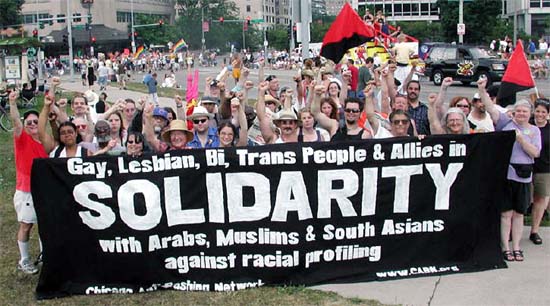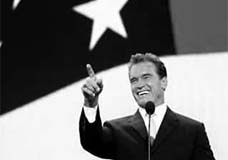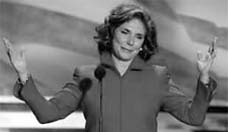
Gay Peace Corps Volunteers 'serve everywhere'
Gay Peace Corps Volunteers 'serve everywhere'
This article was originally published by the Washington Blade on August 20, 1999.
by Kai Wright
Dan Barutta holds the fates of about 1,000 lives in his hands each year.
An estimated 10,000 people apply to join the Peace Corps every year. About 3,500 of those are accepted. Barutta and his colleagues in the placement office decide where they will serve. Sometimes, that's no problem: An applicant trained in agronomy and crop science who speaks both fluent Spanish and Bangla is fairly easy to place. Other times, it can be more complicated -- particularly when there are personal circumstances to consider, such as when the candidate is a proudly out Gay recent college graduate and the placement office is inviting him or her to serve in, say, Uzbekistan, an Islamic nation between Kazakhstan and Afghanistan.
Barutta, an openly Gay man who has served two tours of duty of his own, actually gets this a lot. There's no empirical data to prove it, but anecdotal evidence suggests there are a disproportionate number of Gay people serving in the Peace Corps.
The average age of a volunteer is 29, but the most common age is actually more like 25, still fresh from college. This can create problems, Barutta explains, because a civic-minded Gay volunteer who has spent the last couple of years leading Gay pride rallies on campus doesn't always take kindly to the word "discretion."
"It's a safety issue," Barutta explains. "The worst thing that we could do is place someone overseas who wants to wave the rainbow flag down the streets of Manila and gets beaten up. So, it's our job to educate people. We really encourage Gay and Lesbian people to apply, and we love talking to them if they'll come out to us during the application process. But they've got to know that serving as a volunteer can seem sometimes as semi-in, semi-out of the closet."
Barutta is the president of a roughly 30-member Peace Corps Gay employees group, and he's made a name for himself among recruiters around the country as a good person to refer Gay applicants to for advice. He says he talks to several a year, as do other placement and recruitment officers. It may seem like a dangerous thing for Gay people to do, but Gays are volunteering in all corners of the globe.
Barutta says part of the reason may be that the agency has a built-in culture of tolerance -- that people involved in the Peace Corps are by definition a little more open-minded than the average person.
"Generally, Peace Corps is seen as a very Gay-friendly place, and it is," said agency spokesperson Brendan Daly, adding that there's also no shortage of Gay staff.
Barutta encourages recruiters to place rainbow stickers or pink triangles up in their booths and offices to show potential applicants that the agency is Gay-friendly. He works as a recruiter himself at Gay pride parades back in San Francisco, where he's from, as do any number of "returned" volunteers (there are no "former" volunteers; it's considered a lifelong experience). And when applicants come out during the process, the agency tries to help them navigate the potential complications.
"I'd say, ÔOK, I'm thinking of inviting you to Uzbekistan. Get on the Web, call people in the community, talk to returned volunteers from there, there may be some people who are Gay and Lesbian who you can get in contact with,'" Barutta says, explaining how he deals with people in this situation. "ÔFind out more about what it's like being in a Muslim culture as a Gay person or a Lesbian person, let's talk.'"
One resource he has is to connect an applicant with a network of Gay returned Peace Corps volunteers. In 1991, a group of Peace Corps volunteers in D.C. created a group for Gay returnees. The Peace Corps agency was hosting its 30th anniversary celebration here on the Mall that year, and the group rented a booth at the festival to announce its presence.
"We jst got a lot of attention from people who said, ÔOh, this is fabulous,'" says Dennis Gilligan, who was involved then and is now the "alpha volunteer," as he puts it, of the D.C. chapter. "Although some of us had felt that Peace Corps had a larger than, um, norm percentage of Gay folks, it wasn't until they started slapping down their names and phone numbers and addresses and donations and whatever that we said this is just very real. So that got us off to a good start."
Around 100 people from all over the country joined the group that weekend. Those from San Francisco went home and started a chapter of their own, which also ballooned in size and ultimately became the seat of the national group. Today, the group has five chapters -- in D.C., San Francisco, Seattle, New England, and southern California -- and is an official affiliate of the National Peace Corps Association.
Gay volunteers' experiences cover the spectrum, say Gilligan and Barutta. Some have to adjust from living an out, active college life to a more measured life in a not-so-Gay-friendly village. Others, such as Barutta, come out during their tour. Barutta came out to himself and his fellow Peace Corps volunteers during his first trip to Jamaica in 1981. He was 24 and just out of school.
"I was there, sitting in that lonely little apartment every night, thinking, ÔOh, my God, what are my needs? Oh, my god,'" he recalls. He approached his friends and the medical officer in the country, and they helped him work through it.
His case, he says, is textbook for how things should work for volunteers struggling with their sexual orientation. The agency has a curriculum for medical officers on dealing with Gay issues. And Daly says that any mental health need, including dealing with a traumatic coming out process, would be grounds for flying a volunteer home for counseling.
But Barutta stressed that the support network of Peace Corps volunteers is the best place to find help. For Elizabeth Fuhrman, that was the case a few years ago when she was serving in Sri Lanka. Fuhrman had served earlier in Honduras, in the mid-1980s, but was not out even to herself then. When she began serving in Sri Lanka in 1993, she was just beginning the process of coming out. She says she didn't expect much support from the Peace Corps staff, but she found it among a few friends she met while serving. She agrees with Barutta that, given how much time new volunteers spend together during training, this is the best place to seek help with just about anything.
"You are with them in training for three months," she explains, "and you are really isolated. So you get to know people in your group intensely."
Increasingly, Gay volunteers are forming formal and informal groups of Gays serving in different countries. Both Fuhrman and Barutta have participated in such groups during their service. The groups meet sporadically and are hard to keep together because of the turnover, but just the attempt to create them reveals the increasing public space for Gays around the world. For Gilligan, that's the great thing about his group and Gay Peace Corps volunteers in general.
"We are here," he says, "and we serve everywhere."
For information about the Gay returned Peace Corps volunteers group, go to www.geocities.com/~lgbrpcv/ or write to P.O. Box 33248, Washington, D.C., 20009 for the D.C. chapter




